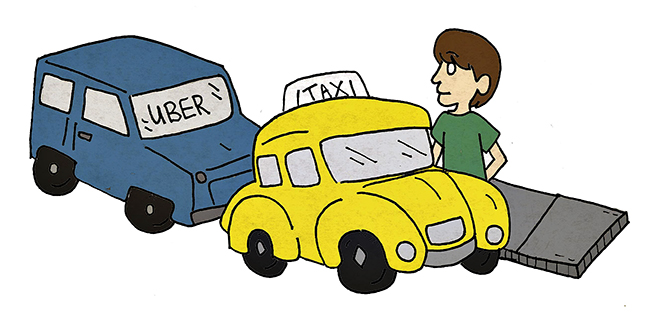Over the last few years, Austin voters have rejected proposals to remedy our city’s pernicious transportation. Proposition 1, the most recent, would have allocated money towards a rail line from the Highland Mall ACC campus to East Riverside Drive. While Austin mayor Steve Adler has prioritized mobility as one of his chief goals for 2016, a solution beyond road improvements looks far off.
These failures have made Austin one of the largest cities in the country that relies on Transportation Network Companies, such as Uber and Lyft, as a key part of its transportation infrastructure. TNCs have provided Austinites with safe and reliable transportation along with thousands of convenient jobs.
But the Austin City Council, led by Councilmember Ann Kitchen and originally supported by Adler, has proposed unneeded regulations which could spell a step back. While thousands of Austinites now find safe, affordable rides, the Council took steps to roll that back by originally mandating that all TNC drivers pass a fingerprint background check. This would likely mean that Lyft and Uber would be unable to get the quantity of drivers needed to match demand in the City, effectively hampering their growth.
The Council has since come up with a compromise — to make fingerprinting voluntary for TNC drivers, with incentives for those who undergo the process — that has not settled the divisive issue. Mayor Adler has thrown his support behind the compromise measure, while councilperson Kitchen has retained the dilatory background checks and automobile inspections in her new TNC regulations draft.
At the same time, a new coalition of TNCs, local musicians and others have collected an astounding 65,000 signatures to force the Council to either approve their proposed ordinance — fully rolling back Kitchen’s proposals — or allow the voters to decide. The Council will decide on the course of action in the next few weeks, after the signatures are certified.
Fingerprinting and City-approved vehicle inspections are ultimately unnecessary for the TNC industry. Only through TNCs are passengers able to have a detailed history of their rides on their phone. Only TNCs allow passengers to view the name, photograph and license plate of their driver. And TNCs already background check their drivers — background checks which are widely accepted as valid by hundreds of other cities in which the companies operate, including many in Texas. Requiring TNC drivers — most of whom drive less than 15 hours a week — to undergo the same inspection as full-time taxi drivers is ludicrous.
For a city that enjoys the moniker “Silicon Hills,” it prides itself on its internationally renowned music festivals and thrives because of a flagship university comprising 50,000 students. It is astounding to see the City ignore the wishes of their constituents in an attempt to impose unnecessary restrictions which could drive away a vital service.
The proposed compromise is a good first step. But ultimately, the TNC safety issue should be put to voters. Austinites understand how crucial services like Lyft and Uber are to the culture and safety of the city. Mayor Adler, councilperson Kitchen and others seek to levy regulations which will inevitably either hamper growth of a superior product and do very little to increase the safety of TNC consumers. The Council must let the voters decide — a return to the days without TNCs could jeopardize the safety and well-being of Austin residents.
Fountain is a government senior from Pelham, New York. Follow Fountain on Twitter @wf_atx.





















